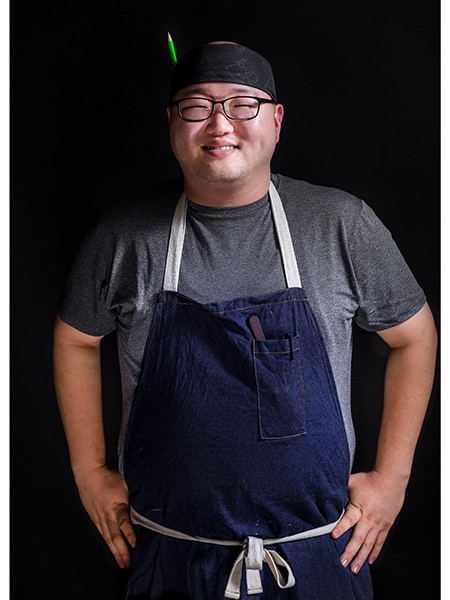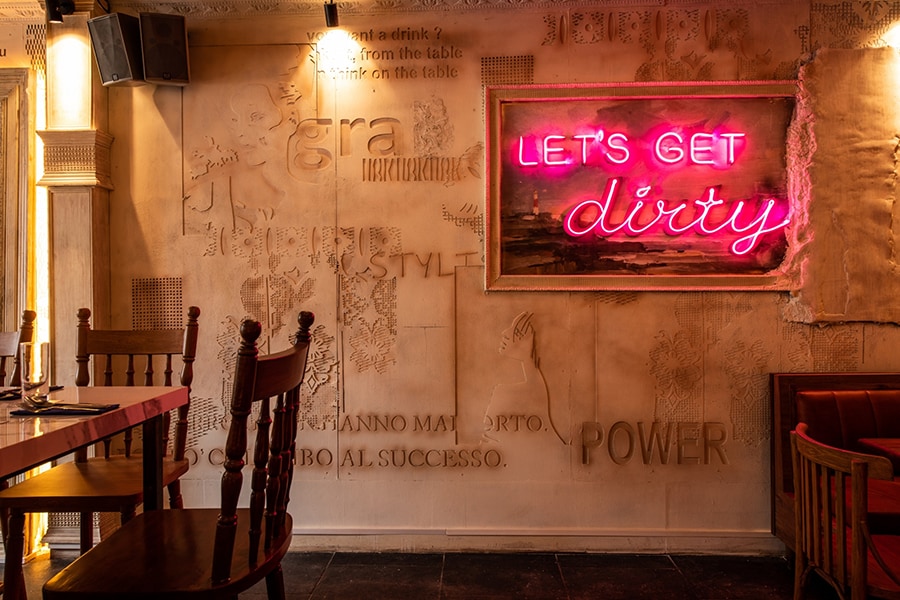Chef Boo Kim's new restaurant is all about eating 'dirty'
The Korean chef speaks about Dirty Buns, his first solo restaurant in Mumbai, and what it takes to be an expat chef in India


 Boo Kwang Kim, Executive Chef at Dirty Buns and F&B Director at Aallia Hospitality[br]
Boo Kwang Kim, Executive Chef at Dirty Buns and F&B Director at Aallia Hospitality[br]
During his last stint in India, Chef Boo Kwang Kim was a regular fixture on Mumbai’s Instagram-party circuit, hanging out with the city’s cool kids. As executive chef of modern restaurants Bastian and One Street Over in Mumbai’s Bandra, eateries known both for their indulgent brunches and celebrity sightings, the chef managed to amass quite a social media following—much like his friend and colleague, Chef Kelvin Cheung. In September last year, Chef Kim announced his last few days in India in an Instagram post, which met with many comments of heartbreak. But he couldn’t stay away long.
The South Korean chef, who has lived in the US for most of his life, is back in the city with a solo venture: Dirty Buns. The Lower Parel restaurant features most dishes wrapped in either a brioche bun or a bao. It’s under the aegis of Aallia Hospitality, the same company that runs Cheung’s One Street and Bastian. With dishes such as a mac and cheese roll, pork tonkatsu bao and a soft shell crab roll, Kim’s contemporary, comfort-food establishment has only one rule: Wear whatever you want, but get ready to get your hands dirty.
Q. In the age of clean eating, what drives the idea of Dirty Buns?
The concept is to do contemporary comfort food. This is what I grew up eating. It’s simple food that is focused on key ingredients—for instance, in the lobster roll, the lobster is the star of the dish, with no additives or masking. So in that sense, it’s clean, but it’s also definitely messy. When you’re eating here, your face is going to be covered in sauce, you’re going to use your hands, and you’re probably going to have a buttery brioche. It’s food you can relax with while sipping on a beer or cocktail.
The flavours are bold, and I brought a bit of my Korean influence into the menu. So I’m doing two kinds of house-made kimchi on the menu—one is a pak choi kimchi and one is a Napa cabbage version. We’re also making our sauces in-house, including eggless aiolis, which you don’t see much of around. Even the ketchup is homemade. We’ve developed a nice habanero-tabasco sauce for people who want more fire than the typical commercial hot sauces.
The menu is a mix of healthy and indulgent dishes. We have a strong salad selection, but at the same time, dishes like our Mac and Cheese Roll that is all cheese and carbs. It’s the ultimate comfort food.
Q. What are the similarities between Korean and Indian food?
They’re very similar. We have a lot of stews in Korean cuisine, and the difference is that while Indians use a masala base, we use fermented paste to start the dish. This could be a red pepper chilli paste (Gochujang), or the fermented soybean paste (Doenjang). Korean dishes are not too spicy, and lighter in flavour, but strong since we use a lot of soy. Then there’s always a lot of condiments and pickle on the table.
However, I’m experimenting with Indian techniques too. I’m testing using various masala spices as garnish, different crumbles, and I’m using a lot of chaat right now. I’m trying to bring a little bit of India into my cuisine right now, and you know, just make fun.
Q. Tell us about your ‘dirty cocktail’ menu…
I’ve teamed up with Afzal Kaba, who was heading the Diageo team. We sat down and spoke about the food, and the drinks he came up with became the perfect match. They’re mostly light and refreshing, but some are a little extra dirty too. For instance, our version of Bloody Mary uses a fresh tomato puree, and instead of the usual celery stick garnish, it comes topped with a bao. The bao sits right on top of the glass and complements the drink. The non-veg one is a chicken meatball bao with tomato, cheese and mozzarella, which goes really well with the Bloody Mary.
 Dirty Buns at Lower Parel, Mumbai[br]Q. Tell us a bit about how you came to Mumbai, and what made you come back…
Dirty Buns at Lower Parel, Mumbai[br]Q. Tell us a bit about how you came to Mumbai, and what made you come back…
I was working in Chicago when a good friend [chef Cheung] called me four or five years ago, to ask if I wanted to move to India to be co-chef. It took me a while to decide—we went back and forth on it a lot. But one day, I just decided I needed a change, and decided to fly out here.
When I left Mumbai last year, I always knew I wanted to come back. At that point, working in a high-stress environment, I just needed a small break to reset. I wanted to go back home to see my parents, my siblings, and especially, my sister’s two children. My niece and nephew didn’t even know what I looked like then. The first month, they would cry every time I would try to hold them. But now they miss me and we FaceTime often. I needed that family time.
We always knew we wanted to work on a restaurant, and had a few concepts in mind. This one worked very well for us eventually, and here we are.
Q. How is running your own restaurant different from helming the kitchen?
I’ve opened many restaurants in my career as the chef, so I have a fair idea of what it takes. But on a solo project, you have to pay attention to every little detail. I’m doing everything from numbers to spreadsheets to cooking and lighting. It’s a little bit harder, but it’s fun.
Q. It’s a good time to be an expat chef in the city, with a close-knit chef community. What has the support been like?
Oh, I’ve got so much love from all the chefs around right now. I don’t know too much about the Kamala Mills market [where the restaurant is located], so I went over to my friends at The Bombay Canteen, and asked for help to source eggs, some vegetables. The chef sent me down with his purchase manager. The other chefs have even sent me staff. They’ve all been very supportive.
That’s a good thing because it’s a small community of chefs and we have to stick together. It’s a competitive business, but we also have to support each other. I make it a point to visit different restaurants and drop in on the chefs, or make plans to go bowling on our chefs WhatsApp group. We do bowling nights every couple of weeks.
Q. What’s the hardest part about being an expat chef in Mumbai?
Communication. I had to find the right team to translate everything for me, from Day 1. I need to get some things done, and they often get lost in translation. But everyone here is very hard working, and very skilled. I just have my own way of doing things, so it takes some time to train them to suit my style. For instance, I’m a firm believer in the old-school philosophy—if you have time to lean, you have time to clean. I don’t like when the staff is standing around or on their phones.
Q. As an Instagram-famous chef in the city, how important is social media to a business like yours?
Social media has a big effect. It helps bring people from far away to come and try your food. They see photos of it, and you’ve triggered a desire for them to try it, and they make the trip. I have no social media strategy as such. All my posts are very fun, a reflection of whatever I feel like that day. I post every single day on my Instagram stories.
Q. Any dishes on this menu that you know will become Instagram hits?
The Dirty Boo—that’s my all-in-one dessert. It’s created to please everyone on the table. It has a waffle, pancake, dark chocolate ice cream, caramel sauce, doughnut, a churro and fresh fruit. It’s meant to be shared by the whole table—something fun to use your hands to tear, dip into sauce or cream, and just eat.Dirty Buns is at Trade View Building, Kamala Mills Compound, Lower Parel, Mumbai. It opens to public on June 27, 5 pm onwards
First Published: Jun 21, 2019, 08:59
Subscribe Now